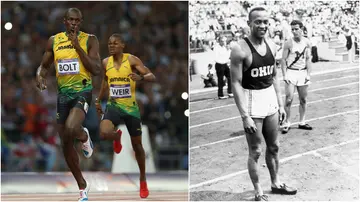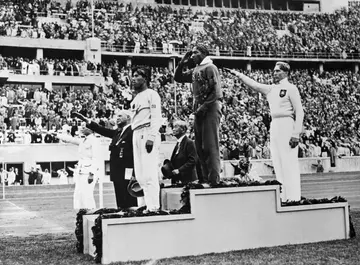Who is the best badminton player in the world right now? A top 10 list
Other Sports
The 100m is arguably the most exciting event at the Olympics. It has given us incredible moments over the years and continues to do so.
Usain Bolt comes to mind when one thinks of the distance, but there is over 128 years of history.

Before Usain Bolt and Jamaica's dominance in the distance, the USA were the kings and queens in the 100m.
In more than 100 years, the 100m, which lasts for a few seconds, has produced drama, agony, and joy.
PAY ATTENTION: stay informed and follow us on Google News!
The race has evolved since the first Olympic Games in 1896 in Athens, Greece. Records were hand-timed for over half a century before automatic timing became a thing in 1977.
Who is the best badminton player in the world right now? A top 10 list
Other Sports
America dominated the men's 100m in the first three Olympic games (1896, 1900, 1904)
Thomas Burke became the first man to win gold in the 100m. The 21-year-old blew away the field to win in 12 seconds. He also won gold in the 400m in 54.20 seconds.
Frank Jarvis won gold in the 1900 games held in Paris. He finished in 11.0 seconds in a race run on grass.
Archie Hahn made it a hat-trick for USA in 1904 in St. Louis. He clocked 11 seconds as the USA took the first six positions. Hahn won the 200m and 60m.
South Africa's Reggie Walker ended American dominance with a win in 1908 in London, but the USA roared back with a clean medal sweep in 1912, led by Ralph Craig in Stockholm. After World War 1, Charlie Paddock took gold in 1920 in Antwerp.
Who are the 10 best women track stars in the globe currently?
Other Sports
Harold Abrahams from Great Britain and Canada's Percy Williams briefly ended America's dominance in 1924 and 1928, respectively.
USA recaptured the title in 1932 through Eddie Tolan, who set a world record of 10.3 seconds and an Olympic record of 21.2 seconds in the 200m.
In 1936, in Germany, years before the bloody World War II, the men's 100m took off. American Jesse Owens won four gold medals in the 100m, 200m, 4x100m relay and the Long Jump. He was the first American to win four gold medals at the Olympics.
His achievement was the stuff of legend since it came during a hostile political environment in Germany. Carl Lewis matched his achievements 48 years later.

After the war, the Olympic Games returned in 1948, and the USA won five of the next six gold medals. Harrison Dillard won gold in 1948 when the starting blocks were first used. Lindy Remigino (1952) and Bobby Morrow (1956) continued America's streak.
Who are the top 10 richest athletes in Kenya as of 2023?
Athletics
That dominance was ended in 1960 by Germany's Armin Hary, who was the first man to run 100m in 10 seconds.
America's Bob Hayes won gold in 1964 in Tokyo, matching Hary's time before embarking on a successful career in the NFL.
In 1968, the USA's Jim Hines became the first man to break the 10-second barrier. He clocked a world record 9.95 seconds to win gold in Mexico.
Valery Borzov took gold for the Soviet Union in 1972. In 1976, Hasely Crawford of Trinidad and Tobago won gold in the Montreal Games.
The USA boycotted the 1980 Olympic Games in Moscow, which Great Britain's Allan Wells won. Wells is the last white man to win the men's 100m at the Olympics.
American sprint icon Carl Lewis triumphed in 1984 and 1988. The 1988 race remains one of the most controversial in the last few decades.
Canada's Ben Johnson and Lewis were in a heated rivalry. In the final, Johnson destroyed Lewis with a world record time of 9.79 seconds but was disqualified after it emerged he had used a banned steroid.
Which is the best race horse of all time? Find out here
Other Sports
Lewis was awarded the gold medal. The 1988 final tainted the 100m, with most of the finalists accused of using performance-enhancing medications, per Reuters. It is dubbed the dirtiest race in history.
Great Britain's Linford Christie won gold in 1992 in Barcelona, while Canadian Donovan Bailey won in 1996 with a world record time of 9.84 seconds, per World Athletics.
Maurice Greene and Justin Gatlin won in 2000 and 2004, the last gold medals USA won in the 100m. The next three gold medals were won by Usain Bolt, who raised the bar. The Jamaican holds the three fastest times in the distance. He is the only man to run under 9.6 seconds.
Italy's Marcell Jacobs narrowly won gold at the 2020 Tokyo Olympics.
The USA are the favourites to win gold at the 2024 Paris Olympics later this year.
Sports Brief earlier reported on Usain Bolt backing Noah Lyles to break his two world records.
Best Yankees of all time: Who is the greatest Yankee player ever?
MLB
Bolt holds world records in the 100m and the 200m, which have never been touched in 15 years.
Lyles won three world titles last year and has expressed his ambition to break Bolt's invincible records.